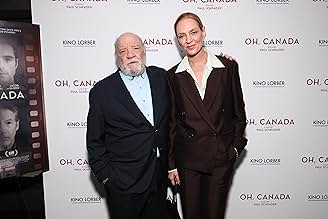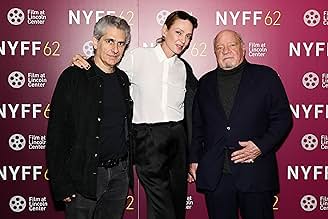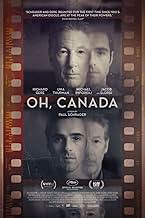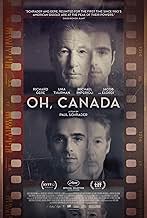AVALIAÇÃO DA IMDb
5,6/10
2,4 mil
SUA AVALIAÇÃO
Leonard Fife, um dos sessenta mil fugitivos e desertores que fugiram para o Canadá para não servir no Vietnã, compartilha todos os seus segredos para desmitificar sua vida mitificada.Leonard Fife, um dos sessenta mil fugitivos e desertores que fugiram para o Canadá para não servir no Vietnã, compartilha todos os seus segredos para desmitificar sua vida mitificada.Leonard Fife, um dos sessenta mil fugitivos e desertores que fugiram para o Canadá para não servir no Vietnã, compartilha todos os seus segredos para desmitificar sua vida mitificada.
- Direção
- Roteiristas
- Artistas
- Prêmios
- 1 vitória e 2 indicações no total
- Direção
- Roteiristas
- Elenco e equipe completos
- Produção, bilheteria e muito mais no IMDbPro
Avaliações em destaque
Jack elordi is the young leo fife, while richard gere is the older, grown up film maker. He's telling his story towards the end of his life, but it's very complicated. He admits to making mistakes, but he says he will tell the truth. Flashback to fife as a young man. So many decisions to be made. Going to war. Running a company. Leaving. Always leaving. But some of the stories get so strange, it's not clear what's true and what is just being mis-remembered. Maybe the lies about all the lies is the real story. And the fact that fife has cancer. He's quickly getting confused and feeble, and angry. It's interesting. And mostly good. The jumping forward and backward sometimes gets confusing. The amount of uncertainty and confusion will annoy some people. Many things are left to the viewer to resolve. Directed by paul schrader. Was nominated for first reformed. Story by russell banks.
At best, this appears to be a case of Paul Schrader reading a novel and getting so impressed by it that he leapt straight into adapting the parts he seemingly considered most relatable, and somewhere along the way, he appears to have forgotten most of his audience would not have read that novel and so be lost when it comes to what he considers "obvious". At worst...well, consider that a director who just two years ago claimed "woke Oscars mean less each year" had now made a film where the moral center of its universe is a pillar of 1960s medium enterprise capitalism, and we are effectively told outright the main character's life had been a failure ever since he abandoned his chance to succeed in his footsteps and pursued filmmaking instead. Quite a coincidence, don't you think?
To clarify, I am fine with the premise that the main character is a jerk. Lots of great fiction features a badly (at times overwhelmingly) flawed protagonist - but to be great or at least good, it needs to be interesting! "Leonard" here is shown to be unsympathetic so early and so decisively, the narrative then proceeds to simply compound the point we already know, and not in captivating ways either. Perhaps the novel was more careful about building Leonard Fife up first so that knocking him down would actually be dramatic but Schrader neglected it; perhaps, he assumed viewers would associate the main character with himself (some reviewers certainly appear to have made that connection, even I very much doubt it) and thus project the films Schrader directed IRL onto him. However, it is just as possible this is simply how Schrader thought the story ought to be, with no other caveats.
Even worse is that the film is actively hostile to not just him as a person, but also to his work and seemingly the entire field of documentary filmmaking. A talented artist being an awful person is a frequent, completely believable story - but here, he effectively stumbles into success. Even after his first lucky break, he is never shown doing anything which requires skill (other than perhaps being able to quote Sontag) - and yet, he is feted as an icon by the Canadian society as a whole and by his colleagues. The unmistakable implication is that the other documentarians work even less than he did, and the effete Canadian society is unable to tell a real talent from a fraud. Considering that Schrader has little connection to Canada and the only thing he ever made which can charitably be called a documentary is a 5m short about his painting, it's hard to avoid viewing this as a reflection of personal beliefs.
Funnily enough, the strongest parts of the film all involve what would ordinarily be a mere framing device. The film would unironically be better if it never left that one house in the present day, if it was just Richard Gere rambling on aloud and in his internal monologue while Uma Thurman is trying in vain to hold him back and we never got to see a single flashback play out on the screen.
To clarify, I am fine with the premise that the main character is a jerk. Lots of great fiction features a badly (at times overwhelmingly) flawed protagonist - but to be great or at least good, it needs to be interesting! "Leonard" here is shown to be unsympathetic so early and so decisively, the narrative then proceeds to simply compound the point we already know, and not in captivating ways either. Perhaps the novel was more careful about building Leonard Fife up first so that knocking him down would actually be dramatic but Schrader neglected it; perhaps, he assumed viewers would associate the main character with himself (some reviewers certainly appear to have made that connection, even I very much doubt it) and thus project the films Schrader directed IRL onto him. However, it is just as possible this is simply how Schrader thought the story ought to be, with no other caveats.
Even worse is that the film is actively hostile to not just him as a person, but also to his work and seemingly the entire field of documentary filmmaking. A talented artist being an awful person is a frequent, completely believable story - but here, he effectively stumbles into success. Even after his first lucky break, he is never shown doing anything which requires skill (other than perhaps being able to quote Sontag) - and yet, he is feted as an icon by the Canadian society as a whole and by his colleagues. The unmistakable implication is that the other documentarians work even less than he did, and the effete Canadian society is unable to tell a real talent from a fraud. Considering that Schrader has little connection to Canada and the only thing he ever made which can charitably be called a documentary is a 5m short about his painting, it's hard to avoid viewing this as a reflection of personal beliefs.
Funnily enough, the strongest parts of the film all involve what would ordinarily be a mere framing device. The film would unironically be better if it never left that one house in the present day, if it was just Richard Gere rambling on aloud and in his internal monologue while Uma Thurman is trying in vain to hold him back and we never got to see a single flashback play out on the screen.
It's bad enough when a film disappoints and doesn't live up to expectations. But what's perhaps worse is when a picture not only fails to live up to expectations, but also validates the negative reputation that precedes it. Such is the case, regrettably, with the latest feature from filmmaker Paul Schrader, an embarrassingly bad production from an artist who has written and/or directed such masterful works as "First Reformed" (2017), "American Gigolo" (1980), "Mishima: A Life in Four Chapters" (1985), "The Last Temptation of Christ" (1988) and "Taxi Driver" (1976). This miserably unfocused slog struggles to tell the story of Leonard Fife (Richard Gere), a famous but terminally ill director who's being interviewed for a made-for-TV biography discussing his legendary life and career as a revered documentary filmmaker. However, the protagonist doesn't see this so much as a congratulatory tribute to his accomplishments but as a cathartic, unburdening confession about the life he led that virtually no one knows anything about. To complicate matters, his rapidly failing health and cloudy memory keep him from fulfilling this objective, especially when he reveals secrets about himself not known by even those closest to him (most notably, his wife, Emma (Uma Thurman), and his protégé, Malcolm (Michael Imperioli), director of the biography), revelations that they're quick to attribute to faulty recall. Leonard's previously hidden back story comes to life through a series of clumsy, disjointed flashbacks featuring his younger self (Jacob Elordi) presented in a largely unintelligible fashion that brings new meaning to the term "nonlinear." What's worse, though, is that the relevance of these admissions largely goes unexplained and unresolved, bearing seemingly little relation to the nature of his character or his career as an auteur. His flight to Canada and experience as a conscientious objector during the Vietnam War, for example, receives surprisingly little attention given that his defection from the US is essentially responsible for what made his vocation as a filmmaker possible. Then there are snippets from his many passing dalliances with women that make for a story more like "Oh! Calcutta!" than "Oh, Canada." Taken together, these elements make for a hodgepodge of moments from a life undefined, one that viewers are likely to care little about in the end. Such work is highly uncharacteristic for an artist like Schrader, which makes the impression it leaves all the more worse. Whatever the director was going for here, it's not particularly clear. And that's too bad, given that the filmmaker appears to have had plenty of good material and resources to work with here, including a cast of players who turn in some of their best-ever on-screen performances, the dreadful script that they've been handed notwithstanding. For what it's worth, the result is a major disappointment, one that exceeds the negative impressions it has already left on so many movie lovers who expect more from a talent like this.
Perusing the reviews already on here regarding this movie. I notice there are a wide range of scores and views. Some giving it 8 or higher pronouncing it a work of genius. Where as others are giving it a 3 or less. Claiming it a bunch of pretentious rubbish.
Where do I stand? Hmm. I've just watched it and I am still digesting. It is possibly a movie to be watched several times to get the true meaning. Although I must admit there is no way I would sit through this film again. I'm pleased I have seen it but it certainly will not be going in my bag of films to watch again.
I'm going down the middle with a 5. That's possibly being too kind.
Where do I stand? Hmm. I've just watched it and I am still digesting. It is possibly a movie to be watched several times to get the true meaning. Although I must admit there is no way I would sit through this film again. I'm pleased I have seen it but it certainly will not be going in my bag of films to watch again.
I'm going down the middle with a 5. That's possibly being too kind.
Richard Gere is a respected maker of hard-hitting, muckraking documentary films. He works with his wife and producer, Uma Thurman. Many years ago he fled from the United States in protest over the Viet Nam War. Now it is 2023, he is dying, and several students of his are making a documentary, interviewing him over the protests and under the watchful eye of his producer and wife, Uma Thurman.
Schrader is a careful writer, and there are several ways to interpret this movie. Certain critics have called it "autobiographical" because they are so intellectually lazy that they can't be bothered to think more than one thought before they give up. There may be autobiographical points to this movie. Certainly the movie reflect Schraeder's opinions, rather, than say, a panda bear's, or those of a large lump of rock scraped down from the Laurentian Shield into the terminal morrain of Long Island. That, I believe, doesn't make it autobiographical, nor does the fact that the guy is a film maker. There are film makers and film makers. Even though Gere and the folks making the film-within-the-film want to make a sensational film no matter what the cost, Miss Thurman's only wish is to protect her husband, even though she already knows the worst.
I did consider whether this was a meditation on film making itself. It certainly has aspects of that. A film maker will shoot many more feet of film than he winds up needing, and edits it into a final form that may or may not bear any relationship to reality or the film maker's original intentions. As Gere dies on camera and over the course of the movie, the events of his life that he wishes to tell come up confused and mishappen, conflating and confabulating with each other. To make sense of that, to make a movie of that -- for the guys within the film already have a contract to sell the film -- will require an editor. That is the true work of any story teller: to arrange events and characters within a story, so that it makes sense to the audience.
But more central to understanding this film is to see that, like others in Schraeder's body of work, it is primarily concerned with outrage. In some ways his work resembles that of Ingmar Bergman: raised religiously, he pondered human fallibility in a world with no G*d to lend an objective framework of right and wrong: puzzlement and disappointment, leaving the audience the question of how to work out a system of morality. Schraeder, on the other hand, seems outraged, filled with despair, and leaving the mess to be cleaned up by the unfortunate survivors. Gere leaves the film makers to make sense of his interview, and Miss Thurman to clean up the mess and lies he has made of his life. It's not Gere's problem: he's dead. And it's not Schraeder's.
Anyway, those are a couple of the ways of viewing the film that I came up with. If you see the movie, despite the fact there's not an explosion or a good joke on view, let me know if they make sense to you. And if you have any interpretations that are different, too.
Schrader is a careful writer, and there are several ways to interpret this movie. Certain critics have called it "autobiographical" because they are so intellectually lazy that they can't be bothered to think more than one thought before they give up. There may be autobiographical points to this movie. Certainly the movie reflect Schraeder's opinions, rather, than say, a panda bear's, or those of a large lump of rock scraped down from the Laurentian Shield into the terminal morrain of Long Island. That, I believe, doesn't make it autobiographical, nor does the fact that the guy is a film maker. There are film makers and film makers. Even though Gere and the folks making the film-within-the-film want to make a sensational film no matter what the cost, Miss Thurman's only wish is to protect her husband, even though she already knows the worst.
I did consider whether this was a meditation on film making itself. It certainly has aspects of that. A film maker will shoot many more feet of film than he winds up needing, and edits it into a final form that may or may not bear any relationship to reality or the film maker's original intentions. As Gere dies on camera and over the course of the movie, the events of his life that he wishes to tell come up confused and mishappen, conflating and confabulating with each other. To make sense of that, to make a movie of that -- for the guys within the film already have a contract to sell the film -- will require an editor. That is the true work of any story teller: to arrange events and characters within a story, so that it makes sense to the audience.
But more central to understanding this film is to see that, like others in Schraeder's body of work, it is primarily concerned with outrage. In some ways his work resembles that of Ingmar Bergman: raised religiously, he pondered human fallibility in a world with no G*d to lend an objective framework of right and wrong: puzzlement and disappointment, leaving the audience the question of how to work out a system of morality. Schraeder, on the other hand, seems outraged, filled with despair, and leaving the mess to be cleaned up by the unfortunate survivors. Gere leaves the film makers to make sense of his interview, and Miss Thurman to clean up the mess and lies he has made of his life. It's not Gere's problem: he's dead. And it's not Schraeder's.
Anyway, those are a couple of the ways of viewing the film that I came up with. If you see the movie, despite the fact there's not an explosion or a good joke on view, let me know if they make sense to you. And if you have any interpretations that are different, too.
Você sabia?
- CuriosidadesSecond time that Paul Schrader has adapted one of Russell Banks' novels for the screen, following Temporada de Caça (1997).
- ConexõesFeatured in The 7PM Project: Episode dated 28 March 2025 (2025)
Principais escolhas
Faça login para avaliar e ver a lista de recomendações personalizadas
Detalhes
- Data de lançamento
- Países de origem
- Idiomas
- Também conhecido como
- Oh, Canada
- Locações de filme
- Harriman, Nova Iorque, EUA(The scene that was filmed here is supposed to be a scene where the character played by Jacob Elordi, crosses over into Canada.)
- Empresas de produção
- Consulte mais créditos da empresa na IMDbPro
Bilheteria
- Faturamento bruto nos EUA e Canadá
- US$ 200.980
- Fim de semana de estreia nos EUA e Canadá
- US$ 31.869
- 8 de dez. de 2024
- Faturamento bruto mundial
- US$ 1.276.529
- Tempo de duração1 hora 31 minutos
- Cor
- Mixagem de som
- Proporção
- 2.35 : 1
Contribua para esta página
Sugerir uma alteração ou adicionar conteúdo ausente








































